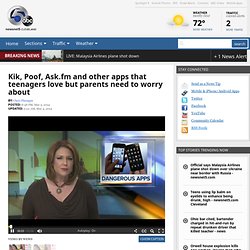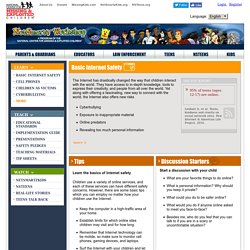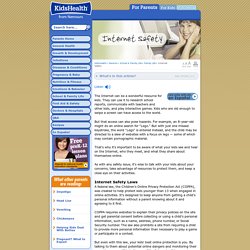

Classroom Posters and Resources for Teaching Students about Digital Citizenship. August 13, 2014 After posting about the iPad apps you should try in the first week of this new school year and after learning about the 26 questions students should be able to answer during this week, now comes the turn to talk to your students about digital citizenship, a concept of high importance for students overall development as good citizens.

Here are some resources I specifically curated for you to use during the first week of this school year. Kik, Poof, Ask.fm and other apps that teenagers love but parents need to worry about. Do you know what your kids are doing online?

Most parents say yes, but the reality of is that they don't. Taylor Scott and Olivia Morgan describe themselves as regular Cleveland-area teens. "Texting of course, Instagram, Twitter, Tumbler, Facebook and Vine," said Scott. They love hanging out and social media. "I love Instagram, Snapchat, Snapchatting," said Morgan. But Richard Warner, a special agent in the Cyber Crimes Unit of the Ohio Bureau of Criminal Investigation said most teens have no idea how risky many of these apps, like Snapchat, can be. Snapchat let's you sent a picture and it self-destructs within seconds.
"What happens when you break up? We are On Your Side with some of the other hottest apps parents may want to watch out for. Kik Messenger is one of the most popular messaging app on the market. Basic Internet Safety. Learning to recognize the warning signs of these risks will allow trusted adults to intervene and lessen potential negative impacts.

By acting as a resource, parents and guardians can help make the Internet a safer place for their families. As a parent or guardian, you should stay well-informed about current issues to understand what your children are experiencing on and off the Internet. If they are social networking, instant messaging, using webcams, or blogging, help them use these tools safely by learning how to use them yourself. Children whose parents and guardians regularly talk to them about personal safety are more likely to exhibit responsible behavior on their own.[1] NetSmartz invites you to learn about the issues surrounding your children’s online lives.
Then use the discussion starters to help you begin a dialogue about safety with your children. [1] Cox Communications Inc. Digital Citizenship. Kidsmart: Digital Footprints. Announcing Our Free iBooks Textbooks! The Social Media 411 For Parents, Educators, & Students [GUIDE] There are numerous websites and mobile apps that allow users to create an account, share content, and connect with others.
![The Social Media 411 For Parents, Educators, & Students [GUIDE]](http://cdn.pearltrees.com/s/pic/th/parents-educators-students-81792079)
‘Social network’ is the broad category to which these services belong. While the most well known of the social networks is likely Facebook, teens have been slowly making an exodus away from Facebook as more of their family members have joined. The percentage of U.S. moms, for example, on Facebook has grown rapidly, from 50 percent in 2010 to 72 percent in 2012. In that same period, the average age of Facebook users climbed from 38 to 41. As a result of these changes, teens have turned to other social networks where they don’t have to worry as much about adults monitoring their exchanges. It is important that students are supported in their use of social media and taught responsible use as a digital citizen.
Social Media Websites, Services & Apps Most Used by Students: Instagram Instagram is an online photo-sharing service that doubles as a social network. Positives: Digital Citizenship Archives. Basic Internet Safety. Safer Internet Day USA. Digital Learning Day. Internet Safety. Listen The Internet can be a wonderful resource for kids.

They can use it to research school reports, communicate with teachers and other kids, and play interactive games. Kids who are old enough to swipe a screen can have access to the world. But that access can also pose hazards. For example, an 8-year-old might do an online search for "Lego. " That's why it's important to be aware of what your kids see and hear on the Internet, who they meet, and what they share about themselves online. As with any safety issue, it's wise to talk with your kids about your concerns, take advantage of resources to protect them, and keep a close eye on their activities. Internet Safety Laws A federal law, the Children's Online Privacy Protection Act (COPPA), was created to help protect kids younger than 13 when engaged in online activities. But even with this law, your kids' best online protection is you. Online Protection Tools Getting Involved in Kids' Online Activities Basic Rules A Word of Caution Back.
Free Online Security and Internet Safety eBook for Kids. Daughter's Facebook Brag Costs Her Family $80,000. Dana Snay/FacebookCall it the biggest Facebook mistake ever.

A daughter’s snarky status update has cost her father the $80,000 settlement he won in an age-discrimination lawsuit. According to the Miami Herald, Patrick Snay, 69, was the headmaster at Gulliver Preparatory School in Miami for several years, but in 2010, the school didn’t renew his contract. Snay sued his former employer for age discrimination and won a settlement of $80,000 in November 2011.
The agreement contained a standard confidentiality clause, prohibiting Snay or the school from talking about the case.